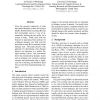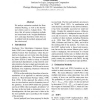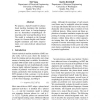134
click to vote
EACL
2006
ACL Anthology
15 years 3 months ago
2006
ACL Anthology
Given the growing complexity of tasks that spoken dialogue systems are trying to handle, Reinforcement Learning (RL) has been increasingly used as a way of automatically learning ...
114
click to vote
EACL
2006
ACL Anthology
15 years 3 months ago
2006
ACL Anthology
We present a weakly supervised approach to automatic Ontology Population from text and compare it with other two unsupervised approaches. In our experiments we populate a part of ...
113
click to vote
EACL
2006
ACL Anthology
15 years 3 months ago
2006
ACL Anthology
We propose models for semantic orientations of phrases as well as classification methods based on the models. Although each phrase consists of multiple words, the semantic orienta...
120
click to vote
EACL
2006
ACL Anthology
15 years 3 months ago
2006
ACL Anthology
We describe our initial investigations into generating textual summaries of spatiotemporal data with the help of a prototype Natural Language Generation (NLG) system that produces...
EACL
2006
ACL Anthology
15 years 3 months ago
2006
ACL Anthology
We analyze estimation methods for DataOriented Parsing, as well as the theoretical criteria used to evaluate them. We show that all current estimation methods are inconsistent in ...
EACL
2006
ACL Anthology
15 years 3 months ago
2006
ACL Anthology
We report work1 in progress on adding affect-detection to an existing program for virtual dramatic improvisation, monitored by a human director. To partially automate the director...
144
click to vote
EACL
2006
ACL Anthology
15 years 3 months ago
2006
ACL Anthology
We propose a backoff model for phrasebased machine translation that translates unseen word forms in foreign-language text by hierarchical morphological abstractions at the word an...
138
click to vote
EACL
2006
ACL Anthology
15 years 3 months ago
2006
ACL Anthology
We place synchronous tree-adjoining grammars and tree transducers in the single overarching framework of bimorphisms, continuing the unification of synchronous grammars and tree t...
100
click to vote
EACL
2006
ACL Anthology
15 years 3 months ago
2006
ACL Anthology
The NLP systems often have low performances because they rely on unreliable and heterogeneous knowledge. We show on the task of non-anaphoric it identification how to overcome the...
EACL
2006
ACL Anthology
15 years 3 months ago
2006
ACL Anthology
This paper presents a way in which a lexicalised HPSG grammar can handle word order constraints in a computational parsing system, without invoking an additional layer of represen...



